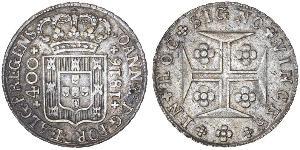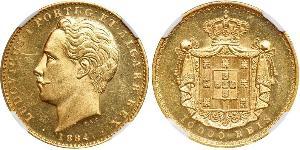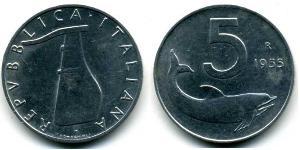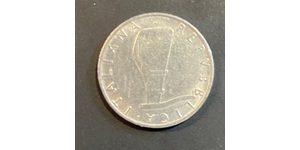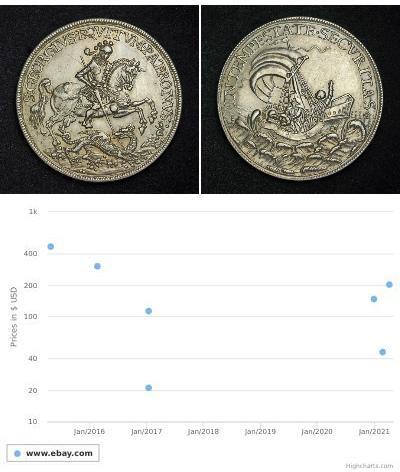10 Reis Kingdom of Portugal (1139-1910) Copper Joseph I of Portug ...
1757, Kingdom of Portugal, Joseph I. Copper X Reis (10 Reis) Coin.
Mint Year: 1757 Reference: KM-243.2. Denomination: 10 Reis (X Reis or ½ Vinten) Material: Copper Weight: 11.43gm Diameter: 33mm
Obverse: Value (X), flanked by rosettes and date (1757) within wreath. Legend: * PORTUGALIAE . ET . ALGARBIORUM . REX .
Reverse: Crowned coat-of-arms within foliage. Legend: JOSEPHUS . I . - . DEI . GRATIA
Joseph I (Portuguese José, Portuguese pronunciation: [?u’z?]), the Reformer (Port. o Reformador), 25th (or 26th according to some historians) King of the Kingdom of Portugal and the Algarves, was born in Lisbon, on 6 June 1714.
He was the third child of King John V of Portugal and his wife Archduchess Maria Anna of Austria. Joseph had an older brother, Peter, but he died at the age of two, an older sister and three younger brothers. At the death of his elder brother, José became Prince of Brazil as the heir-apparent of the king, and 12th Duke of Braganza.
In 1729, Joseph married a Spanish Infanta, Mariana Victoria of Spain, daughter of Philip V of Spain and Elisabeth Farnese, and his elder sister Barbara of Portugal married the future Ferdinand VI of Spain. Mariana Victoria loved music and hunting, but she was also a serious woman who disliked the King’s affairs and did not hesitate to expose them to acquaintances. Joseph and Mariana Victoria had four daughters, two stillborn sons, one stillborn daughter and a miscarriage in 1750.
Joseph was devoted to the Church and the opera. Indeed, he had assembled one of the greatest collections of operatic scores in Europe.
He succeeded to the Portuguese throne in 1750, when he was 35 years old, and almost immediately placed effective power in the hands of Sebastião José de Carvalho e Melo, better known today as the Marquis of Pombal. Indeed the history of Joseph’s reign is really that of Pombal himself. King José also declared his eldest daughter Maria Francisca as the official heiress of the throne, and proclaimed her Princess of Brazil. By this time, the king did not believe he would have a son.
The powerful Marquis sought to overhaul all aspects of economic, social and colonial policy to make Portugal a more efficient contender with the other great powers of Europe, and thus secure his own power status as a result. A conspiracy of nobles aimed at murdering King Joseph and the Marquis gave Pombal the opportunity (some say, the pretext) to get rid of the Távora family, and to expel the Jesuits in September 1759, thus gaining control of public education and a wealth of church lands and ushering Portugal, which had been a backwater dominated by the High Aristocracy and a very conservative brand of Catholicism, into the Enlightenment age.
The reign of Joseph was also famous for the great Lisbon earthquake of November 1, 1755, in which around 100,000 people lost their lives. The earthquake caused Joseph to develop a severe case of claustrophobia and he was never again comfortable living within a walled building. Consequently, he moved the royal court to an extensive complex of tents in the hills of Ajuda. The capital was eventually rebuilt at great cost, and an equestrian statue of King Joseph still dominates Lisbon’s main plaza.
With Joseph’s death on 24 February 1777 the throne passed to his daughter Maria I of Portugal and Pombal’s iron rule was sharply brought to an end, because she hated him very much for his arrogance and violent behaviour.
(1365 X 668 pixels, file size: ~184K)
Posted by: anonymous 2019-09-15
1757, Kingdom of Portugal, Joseph I. Copper X Reis (10 Reis) Coin. Damaged F+ Mint Year: 1757 Reference: KM-243.2. Denomination: 10 Reis (X Reis or ½ Vinten) Condition: Damaged (large digs/hits, possibly old test hits) otherwise F+ Material: Copper Weight: 11.43gm Diameter: 33mm Obvers ...
(1077 X 497 pixels, file size: ~120K)
Posted by: anonymous 2016-02-19
Urcaquary 1765, Kingdom of Portugal, Joseph I. Copper X Reis (10 Reis) Coin. F-VF Condition: F-VF Mint Year: 1765 Reference: KM-243.2. Denomination: 10 Reis (X Reis or ½ Vinten) Material: Copper Weight: 10.64gm Diameter: 33mm Obverse: Crowned coat-of-arms within foliage. L ...
(900 X 457 pixels, file size: ~99K)
Posted by: anonymous 2015-11-17
Portugal, Jose I. 10 Reis 1764. Gomes 08.12. Sehr schön - vorzüglich
(1125 X 420 pixels, file size: ~86K)
Posted by: anonymous 2014-07-22
Details about PORTUGAL 1757 10 Reis Fine
|
5 Lira Italy Aluminium
group has 5 coins / 3 prices
⇑

-500-250-jtkKbzbiFqwAAAFRHs1auxN1.jpg)
-300-150-kGZaNzdmbtgAAAFtioHyvjOC.jpg)
-300-150-VkUKbzbi_VAAAAFSQf1zJPge.jpg)
-300-150-jtkKbzbiFqwAAAFRHs1auxN1.jpg)
-300-150-2MsKbzbitgAAAAFHKSQOlVxr.jpg)
-300-150-q60K_j7gxnIAAAFBYHxJIjht.jpg)




